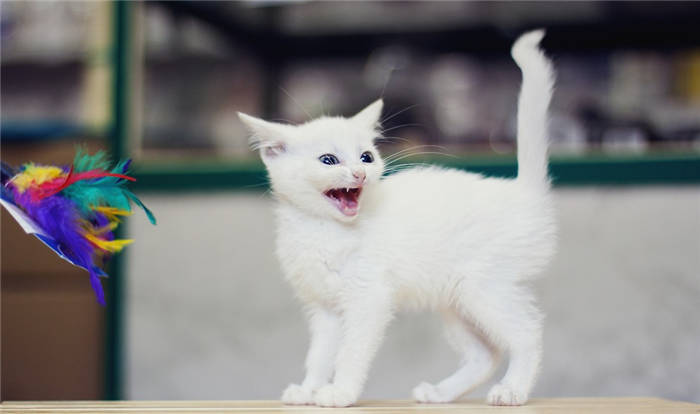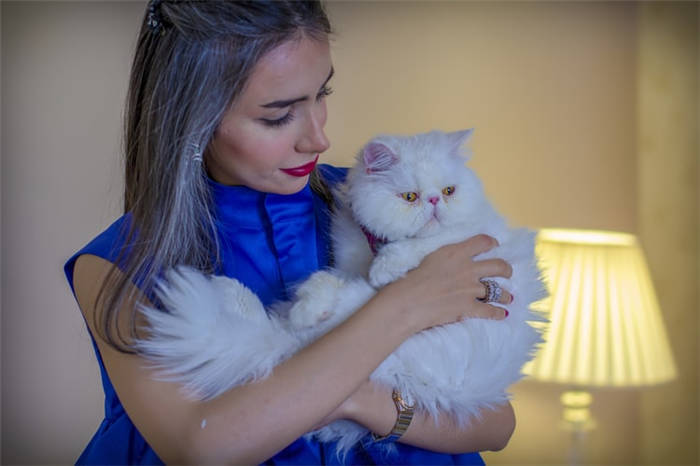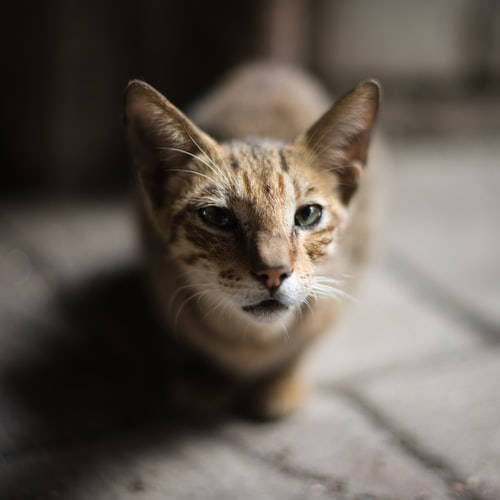If the new mother hisses not at you but at her cubs, don't interfere and carefully watch her behavior from the side. If there are no other warning signs, the kittens are gently licked and fed well, you don't have to worry about them. In this situation, growling is used as a parenting tool and does not need to be corrected.

- 5 reasons why a cat hisses
- hissing as a manifestation of fear
- Why a domestic cat attacks and bites its owner
- Illness or pain
- Cases of Critical Aggression
- Unmet sexual instinct
- If the cause is not clear
- Rabies
- Why cats hiss at their owners: the main reasons for your pet's aggressive behavior
- Reasons cats hiss
- Can it be that a cat hisses and growls for no reason?
- What to do if the cat growls
- Proper human response
- How to calm the cat
- Preventing Aggression
5 reasons why a cat hisses
A characteristic sound for all members of the feline family is hissing. In the usual sense, it means aggression, but in fact it has many more meanings.
Kittens deal with hissing in their first days of life. So, the mother cat uses this sound to warn the baby that a strange cat has appeared or that danger is approaching.
When kittens are a little older, the mother hisses at them if they have gone too far away from her and need to be brought back or attract their attention.
In addition, hissing is a way for kittens to learn how to interact with the world around them. The mother shows the babies when to use it. Then the babies start hissing at each other until they learn to use the sound for its intended purpose. The hissing does not carry any aggression in the learning process.
When the kitten is old enough, the cat hisses at him to wean him off his continuous presence, to teach him independence.
hissing as a manifestation of fear
Of course, the most common situation of hissing is a manifestation of fear, the cat wants to protect itself and shows that it should not be approached. The next step on her part may be defensive aggression. It is important to note that this aggression is precisely to protect itself from unwanted exposure, it is caused by fear and is in no way aimed at attacking first. Fear can manifest itself in an unfamiliar situation, when the cat feels tension, everything is unfamiliar to it and it cannot change anything.
As I have already said, cats are territorial animals, and they can also hiss to protect their territory. For example, if you have a new pet in the house, the cat will hiss the boundaries of its space, to show that it is the owner of this place.
There are situations when a cat hisses, but there seems to be nobody around and it is not clear from whom or what it is defending. In fact, she senses a stranger, a strange cat, even through the door or through the fence of the plot around the house. She defends her territory by focusing on an unfamiliar scent. It does not need to see the object itself to do so.
Why a domestic cat attacks and bites its owner
Aggressive behavior is pushed by a variety of emotions. In the absence of pathology, a disgruntled cat always warns of a possible attack, although withneedles may vary slightly depending on the reason for the aggression:
- presses his ears back;
- arching his back;
- tucks his tail and may even flick it against his sides to show his agitation;
- Lifts the hair along the vertebral column;
- Try to look smaller when defending, squeezing into a lump, but when attacking, lean forward and stretch upward to appear larger
- Makes hissing or rumbling noises.
If you notice such behavior, leave the pet alone and carefully analyze what provoked it. By eliminating the irritating factor, you will avoid new outbursts of anger.

Illness or pain
If the previously affectionate cat has become aggressive and attacks the mistress, the reason for this behavior may lie in pain. A paw that has been injured in a bad landing will react to even the caressiest of touches. The pet may pounce in order to prevent contact with the injured limb.
Pain syndrome is characteristic not only for injuries but also for some diseases: arthritis, infections, oral pathologies and others. Carefully observe the accompanying symptoms. If apathy, disturbed sleep, poor appetite, or other symptoms appear, it's best to see a veterinarian. And regular check-ups (examinations, tests) will help to detect chronic diseases in the early stages, as well as pain syndrome.
Another possible cause of attack is the deterioration or complete loss of functionality of one of the senses. Disorders of hearing, vision and smell prevent normal perception of the real picture, distorting the protective function. This problem most often occurs at an older age.
Cases of Critical Aggression
In addition to the situations analyzed, in rare cases aggression is possible, which does not lend itself to the usual methods of correction. Medical intervention is necessary for its extinguishing. Otherwise, an animal in a deranged state can cause serious injury to humans.
Unmet sexual instinct
Negligence in neutering and lack of mating can lead to a serious problem in the future. If your neighbor has a pet of the opposite sex, your pet's hormones risk going into overdrive, which can result in redirected aggression toward their own housemates. Stopping the release of sex hormones usually helps in controlling this behavior.

If the cause is not clear
If you have not been able to assess the cause of aggressive behavior, it is worth seeking help from a veterinarian or a zoopsychologist. Both specialists will assess the health condition, rule out neurological disorders and try to understand the pet's motivation. Once the diagnosis is made, treatment will be prescribed, and the owner will be advised on methods of correction. The further future of the pet is entirely in the hands of the owner.
Rabies
The rabies virus is deadly for mammals, including humans, so it is necessary to be clearly aware of the main signs of its manifestation. Infection occurs when saliva from a sick animal comes into contact with wounds or mucous membranes and most often shows the following symptoms:
The patient should be isolated in a separate room to prevent the virus from spreading. There is no cure for this infection. The only way to protect yourself is timely vaccination.

Why cats hiss at their owners: the main reasons for your pet's aggressive behavior
You should never forget that cats are not just furry friends of people, but real predators. Their hissing is something to be wary of, because it is not a good sign for you.

Cat hissing, whatever it was caused, indicates that it is better not to touch the pet. But it may also be a reason to go to the vet.
This unique sound is different from other sounds cats make. For example, meows, growls, and even howls are generated by the vocal cords. A hiss is produced by forcing air through the cat's mouth while exhaling. If you are close enough when the cat hisses, you can even feel this airflow.
Just as humans have a unique voice, each cat's hiss is also different. It can also vary depending on the situation, from very quiet and barely audible to a loud hiss. Here are a few of the most common times cats hiss.
Reasons cats hiss
It's important to remember that hissing is as much a cat's communication tool as it is a meow. And there is more than one reason for it. Here are the most important ones:
- The cat wants to warn you. This is one of the main reasons, something like, "Don't touch me now, go away and let me do what I want." It's a sign that if you keep acting this way, the cat may use its claws or teeth to defend its territory and itself. But right now it's just hissing.
- The cat is protecting her kittens. Mother cats are very attentive and protective of their cubs, and if the cat feels that you have disturbed her peace, she may hiss to warn you, even if she is the calmest, most affectionate cat in other situations.
- The cat is in pain. For example, if an animal is injured and you accidentally touch the injured area, the cat may respond by hissing. It is as if it is telling you, "That hurts, don't do that again." Remember that animals can be very resistant to pain, and if you notice this behavior in your pet for no apparent reason, it is worth seeing your veterinarian.
- The cat wants to avoid conflict. These animals are protective of their territory, and by hissing they may let other cats know that this is their dominant area.
- A cat wants to be left alone. Some cats are not very affectionate or sociable by nature and prefer to be on their own, so they may hiss at those who try to pet or pick them up against their will. This often happens in families with young children.
TechInsider Networking
The founder of Fashion Press LLC: 119435, Moscow, Bolshoi Savvinsky per. 12, bldg. 6, floor 3, room II;
Editorial address: 119435, Moscow, Bolshoi Savvinsky per. 6, floor 3, room II;
Editor-in-Chief: Nikita Vasilenok
Editorial e-mail: [email protected]
Editorial office telephone number: +7 (495) 252-09-99
Information production mark: 16+
The online edition is registered by the Federal Service for Supervision of Communications, Information Technology, and Mass Media, registration number and date of the decision to register: EL Series No. FS 77 – 84123 of November 09, 2022.
Can it be that a cat hisses and growls for no reason?
Unexplained growling is very rare. Such behavior is observed only in serious mental disorders, when the cat's anger and frustration arise spontaneously and cannot be controlled. Animals born as a result of basic breeding rules are at risk.
If there is a mental disorder, only a veterinarian can deal with the undesirable behavior. A sick pet requires medical treatment, so simple behavioral correction is ineffective here.
It is worth noting that most often the cause is still there, but it is not obvious. That is why it is better to take the cat for a check-up if there is any doubt. If it is all about some behavioral disorder, a consultation with a zoopsychologist may be required to fix it.

What to do if the cat growls
The response depends on the specific situation. In some cases the problem can be solved by yourself, but in others only with the help of a veterinarian.
Proper human response
Try not to provoke an angry animal and carefully watch his tail. This part of the body perfectly communicates emotion. If the cat is actively and loudly tapping on the floor, it should be left alone for at least a couple of hours.
Do not try to pet the cat or take him in your arms. Under the influence of negative emotions it may scratch you very badly.
How to calm the cat
To begin with, simply leave the room. Retreat slowly and carefully, avoiding too sudden movements and raising your voice.
If the cat moves from a defensive position to an attacking one, use any thick cloth within reach. Wrap the cat in it so that only the head is outside. In this position the cat will be completely disarmed and will shift its attention to thinking about its escape plan.

Preventing Aggression
Once you are safe, carefully analyze recent events. Write down the main reasons that may have provoked your pet, and act on the situation:
- Eliminate or minimize sources of fear and stress. Don't sneak up on your pet from behind or make him jump up from a sudden shuffling of his foot. When guests arrive, shield your pet from unwanted companionship and noise by placing him in a secluded corner on a comfortable bed.
- Spend more time with your pet. Frustration occurs not only against the background of separation from the mother, but also with the lack of communication after prolonged loneliness. In both cases, petting saves the day. Regularly play with your pet, support his "conversations" and do not ignore the sudden "attack" of love. If you're busy – distract yourself for at least 1 minute. The absence of indifference will let the cat know that he is appreciated and loved.
- Do not encourage play with your hands and feet. A young kitten's claws usually don't cause serious damage, but over time they become much sharper and larger.
- Don't rush to let the new kitten out of the carrier. At first, keep the "new recruit" in a fenced area or separate room. Also try not to pet it in front of the "old-timer". After the acquaintance of each of the animals equip separate corners for sleeping and feeding, and do not forget to buy them different litter boxes.
- Be attentive to warning signs. Don't annoy your pet if he's actively showing that he doesn't want to sit in your arms or accept your kisses.
- Do not interfere with bird hunting. Cat "chirping" looks very cute, but it is actually provoked by frustration from the inability to reach objects outside the window. It is unwise to disturb the cat at this time, so just leave him alone or quietly watch from a safe distance.
- Use punishments only at the moment of the offense or immediately afterwards. Reprimanding the kitten several hours after the event is completely pointless.
- Have your pet neutered. Removing the reproductive organs will eliminate hormonal surges and prevent the development of cancer.






